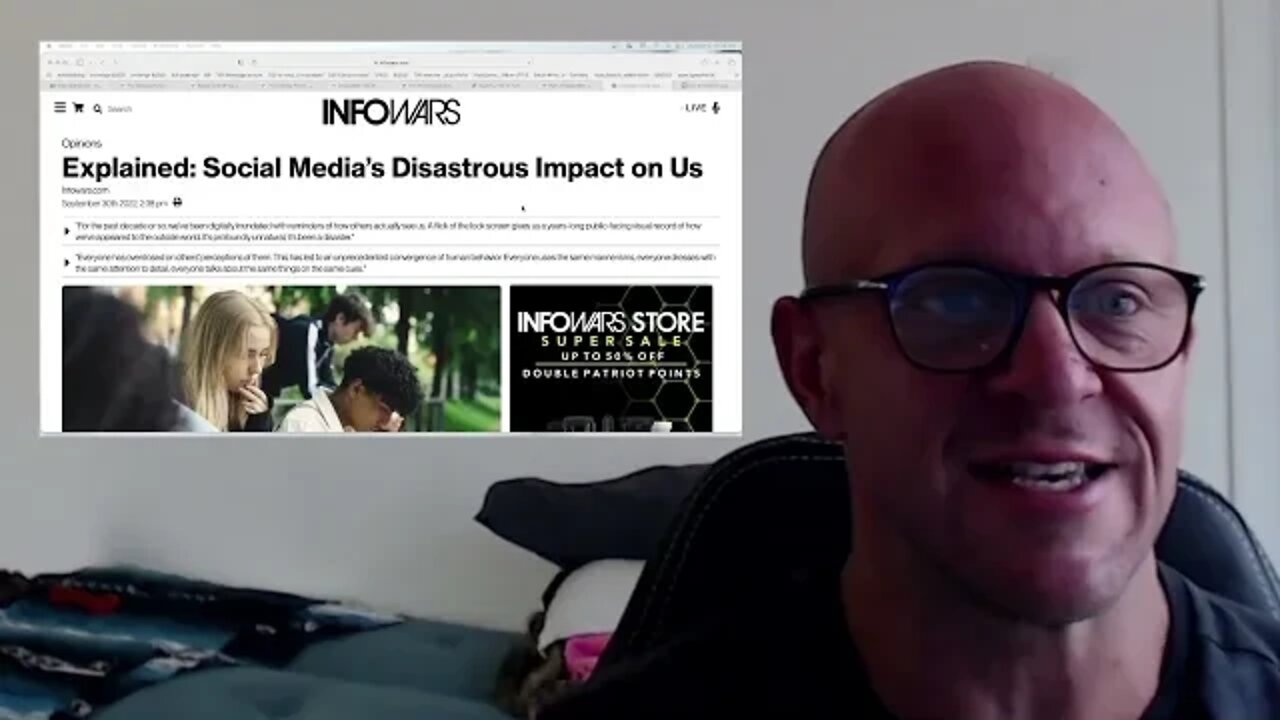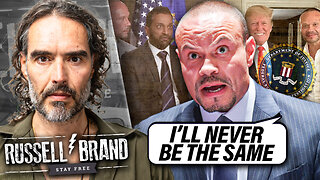Premium Only Content

Explained: Social Media’s Disastrous Impact on Us
#news #socialmedia #america
"For the past decade or so, we've been digitally inundated with reminders of how others actually see us. A flick of the lock screen gives us a years-long public-facing visual record of how we've appeared to the outside world. It's profoundly unnatural, it's been a disaster."
"Everyone has overdosed on others' perceptions of them. This has led to an unprecedented convergence of human behavior. Everyone uses the same mannerisms, everyone dresses with the same attention to detail, everyone talks about the same things on the same cues."
It’s that old post-Jungian idea of the two versions of ourselves, ourselves as we experience the world and others, and ourselves as others actually perceive us. For 199,990 years of human existence, our own perception of self has dominated our interactions with the world.
But for the past decade or so, we’ve been digitally inundated with reminders of how others actually see us. A flick of the lock screen gives us a years-long public-facing visual record of how we’ve appeared to the outside world. It’s profoundly unnatural, it’s been a disaster.
For some, it’s entertaining. You remember a girl from college, that cute blonde from sophomore bio lab, the one with the Roman nose and the great ass. You wish you’d made a move back then. You look up her grainy bikini photos from study abroad ’09. You furiously jack off to them.
This is what Zuckerberg wanted it to be. This is social media in its purest form. You convince that cute girl you admire from afar but are too shy to talk to that she should upload her George W Bush-era bikini photos to the internet so you can jack off to them.
But it got out of hand. What was intended as idle entertainment for socially awkward autists to see if the girl from their intro to C++ class had a boyfriend or not before they asked to be her project partner has metastasized into a psychological prison for normies.
But social media locked them into a horrific self-reinforcing cycle. They see a permanent record of their peers online. They put the best versions of themselves in THEIR online permanent record, their friends see this and try to one-up them with THEIR best versions of themselves.
Etc etc ad infinitum.
A certain man called it “oversocialization” he was talking about the 60s, though. I can only imagine what he’d have to say about where we are today. The college campuses of the Nixon years might as well be ancient Sumeria compared to the social melange of the past decade or two.
Now, everyone’s overdosed on others’ perceptions of them. This has led to an unprecedented convergence of human behavior. Everyone uses the same mannerisms, everyone dresses with the same attention to detail, everyone talks about the same things on the same cues.
Few things that we do now aren’t filtered through the ever-oppressing consensus of mutual hyper-perception. Even those who believe that they’re going against the grain unwittingly conform to an increasingly optimized set of behaviors in order to maximize external engagement.
Now, everyone is Brittany Murphy in Clueless, the proverbial new girl trying desperately to fit in with the ever-changing whims of the cool girl’s clique. Only instead of Alicia Silverstone, it’s a planet-spanning silicon behemoth with billions of eyes looking in on it daily.
And that’s just the Gen Xers and millennials.
Gen Z has it incomprehensibly worse. While older folks at least had the chance to form a truly self-directed idea of themselves before social media shattered it and replaced it with a crowdsourced facsimile, Gen Z has known nothing but the machine.
There’s a reason why all of the silicon valley bigwigs chose to raise their own kids Waldorf style, as far from any electronics as possible.
This modern social media-corrupted “childhood” is a behavioral prison, with all elements of natural behavior or spontaneity now subsumed by fears of how others might later see it.
It’s the age-old high school gossip machine, long the nemesis of youthful exuberance, but now it’s been pumped up on V’ger steroids, and it’s scanned and digitized every aspect of young people’s lives, replacing them with a cold, sterile facsimile of what it means to be young.
And all because Mark Zuckerberg wanted to creep on his classmates.
But in the interim, we face something almost unprecedented, a world in which the freest thinkers, the ones who will be able to reverse the damage and build a better future aren’t the young, but those old enough to have been relatively uncorrupted by digital life.
It’s an inverse 1960s.
Don’t trust anyone under 30.
If you would like to support my work you can send donations to my BITCOIN or MONERO WALLET
XMR Address:
45QvQCuctod925UvmTRHTkWTzrvM4c4EQQvouJAVgoHvdqR7ppDDX3zS5yJMroGFE3A2trfrGPySwLKTXXKEaZio34z5mzB
BTC Address: 3C5ewv4oDw84P8LYKoB98mJgNauY7U2oXb
-
 LIVE
LIVE
The Quartering
1 hour agoToday's Breaking News With Josie The Red Headed Libertarian, Hannah Claire & Luke Rodkowski
2,799 watching -
 LIVE
LIVE
Russell Brand
1 hour ago“I’ll NEVER Be The Same…This SHOCKED Me” Dan Bongino Breaks Silence & Vows to Reveal “TRUTH” - SF621
26,719 watching -
 LIVE
LIVE
Akademiks
47 minutes agoDrake Tries for another #1?? Kodak vs YB still? Ksoo gets snitched on. Doechii plz stop botting
1,499 watching -
 LIVE
LIVE
Sean Unpaved
1 hour agoGridiron to Diamond: Rookie QBs, Madden 99s, Salary Caps & NIL's Ripple Effect
567 watching -
 LIVE
LIVE
Nerdrotic
4 hours agoCancel Kurtzman Trek | The Fate of the Superhero Film - Nerdrotic Nooner 502
544 watching -
 25:24
25:24
Scary Mysteries
5 hours agoSTRANGE & SCARY Mysteries of The Month - July 2025
179 -
 LIVE
LIVE
Dr Disrespect
2 hours ago🔴LIVE - DR DISRESPECT - WARZONE - RAGE ON THE MAIN STAGE
2,009 watching -
 1:02:02
1:02:02
Timcast
2 hours agoTrump BULLIES Europe Into MONSTER Trade Deal, Europe COPING Over Trump MASTERCLASS
106K45 -
 2:07:13
2:07:13
Steven Crowder
4 hours ago🔴Game Over: Trump's EU Trade Victory Shows How Stupid "Experts" Really Are
309K149 -
 20:03
20:03
Neil McCoy-Ward
1 hour agoTHE UK 🇬🇧 JUST ENDED 140 YEARS OF FREE SPEECH! (How Did It Come To THIS?!)
3.87K1